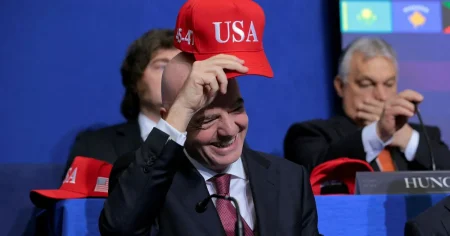Kerstin Elserth, a prominent figure in Swedish football governance, has resigned from her position as chair of the Swedish Football Association’s (SvFF) appeals committee, a year before her term was due to end. This dramatic departure is a direct protest against the SvFF’s decision to vote in favor of Saudi Arabia hosting the 2034 FIFA World Cup. Elserth, who has served on various SvFF committees for nine years, has vehemently criticized the association’s stance, labeling their actions ”spineless” in the face of Saudi Arabia’s well-documented human rights abuses. Her resignation underscores a deep division within Swedish football regarding the ethical implications of awarding major sporting events to nations with questionable human rights records.
Elserth’s central argument revolves around the concept of ”sportswashing,” a practice where authoritarian regimes leverage the prestige of hosting international sporting events to deflect attention from their human rights violations and improve their global image. She contends that Saudi Arabia’s bid for the 2034 World Cup is a clear example of this tactic. Moreover, she criticizes FIFA for effectively ensuring Saudi Arabia’s victory by presenting them as the sole candidate, thereby limiting the options available to voting members. While acknowledging the complexities of international sporting politics, Elserth maintains that Sweden could have, at the very least, abstained from voting, as Norway did, to signal disapproval of Saudi Arabia’s human rights record. She draws a parallel with the 2022 World Cup in Qatar, another nation criticized for its human rights practices, but highlights that at the time, multiple bids existed, fostering a degree of hope that the event might catalyze positive change. The perceived lack of progress in Qatar has solidified Elserth’s conviction that awarding the 2034 World Cup to Saudi Arabia is unacceptable.
Elserth’s resignation is a powerful indictment of what she perceives as a moral failing within the SvFF and the broader footballing community. Her decision to sever ties with Swedish football underscores the depth of her concern and her unwillingness to be associated with an organization that, in her view, prioritizes political expediency over human rights principles. Her statement, ”I don’t want to have any connection with Swedish football when it’s like this,” encapsulates her disillusionment and serves as a stark warning against the normalization of sportswashing.
The SvFF, under the leadership of its chairman, Fredrik Reinfeldt, has responded to Elserth’s resignation with a brief statement acknowledging the existence of differing viewpoints on the matter. This seemingly neutral response, however, arguably sidesteps the core issues raised by Elserth’s protest. The brevity and generality of the statement avoid engaging with the specific criticisms leveled against the SvFF’s decision-making process and its apparent disregard for human rights concerns. This lack of substantive engagement risks reinforcing the perception that the SvFF is unwilling to grapple with the ethical implications of its actions.
The controversy surrounding the 2034 World Cup bid highlights the inherent tension between the apolitical facade of international sport and the unavoidable political realities that shape its landscape. The decision to award major sporting events to countries with questionable human rights records inevitably raises questions about the complicity of sporting bodies in legitimizing these regimes. Elserth’s resignation forces a reckoning with these uncomfortable questions, demanding a more robust and transparent discussion within FIFA and its member associations about the ethical considerations that should guide the selection of host nations.
The broader context of this controversy encompasses the growing scrutiny of sportswashing tactics by authoritarian regimes. The use of sport to enhance national prestige and deflect criticism is not a new phenomenon, but the increasing awareness of these strategies has led to greater pressure on sporting organizations to consider the human rights implications of their decisions. Elserth’s resignation can be seen as part of a larger movement advocating for greater accountability and ethical considerations within the world of sports. Her action serves as a call to action for other individuals and organizations to take a stand against sportswashing and to prioritize human rights principles over political and economic considerations.














